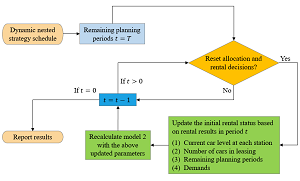Dynamic Allocation Strategy for the Car Rental Industry with Multiple Rental Channels
Dynamic Allocation Strategy for the Car Rental
DOI:
https://doi.org/10.46604/ijeti.2024.13827Keywords:
car rental, constrained mathematical model, heuristic, multi-channel, nested allocationAbstract
This paper addresses the rental car allocation problem in which a car rental company rents its cars through various channels. This study proposes a constrained model based on the nested-allocation structure to allocate the rental cars to the car rental system to maximize the total rental revenues. The nested allocation strategy uses the concept of whether the number of sales accumulated to a certain level exceeds a threshold corresponding to that sharer. This approach allows the quota of low-profit channels to support the leasing demand of high-profit channels at any time, thereby increasing revenue. The proposed model can dynamically adjust the nested strategy as the dynamic programming model. However, it avoids the issues of ample storage space and long calculation time commonly encountered by the dynamic programming model. Computational results show that the proposed nested approach substantially outperforms the traditional exclusive allocation approach.
References
Statista, “Shared Mobility - Worldwide,” https://www.statista.com/outlook/mmo/shared-mobility/worldwide, accessed on 2023.
J. Lucas, “The Thriving Global Car Rental Market: Exploring Trends, Growth, Report, Size, Key Players, Share, Forecast 2024-2032,” https://www.linkedin.com/pulse/thriving-global-car-rental-market-exploring-trends-growth-lucas-9ekvc, March 2024.
S. D. Wu, “Supply Chain Intermediation: A Bargaining Theoretic Framework,” Handbook of Quantitative Supply Chain Analysis: Modeling in the E-Business Era, Boston, MA: Springer US, pp. 67-115, 2004.
B. Stangl, A. Inversini, and R. Schegg, “Hotels’ Dependency on Online Intermediaries and Their Chosen Distribution Channel Portfolios: Three Country Insights,” International Journal of Hospitality Management, vol. 52, pp. 87-96, 2016.
Q. Yan, S. Zhou, and S. Wu, “The Influences of Tourists’ Emotions on the Selection of Electronic Word of Mouth Platforms,” Tourism Management, vol. 66, pp. 348-363, 2018.
R. Law, S. Qi, and D. Buhalis, “Progress in Tourism Management: A Review of Website Evaluation in Tourism Research,” Tourism Management, vol. 31, no 3, pp. 297-313, 2010.
R. Klein, S. Koch, C. Steinhardt, and A. K. Strauss, “A Review of Revenue Management: Recent Generalizations and Advances in Industry Applications,” European Journal of Operational Research, vol. 284, no. 2, pp. 397-412, 2020.
M. Altin, Z. Schwartz, and M. Uysal, “Where You Do It” Matters: The Impact of Hotels’ Revenue-Management Implementation Strategies on Performance,” International Journal of Hospitality Management, vol. 67, pp. 46-52, 2017.
S. Dasgupta, C. H. Papadimitriou, and U. Vazirani, Algorithms, London: McGraw-Hill Publishing, 2006.
B. B. Oliveira, M. A. Carravilla, and J. F. Oliveira, “Fleet and Revenue Management in Car Rental Companies: A Literature Review and an Integrated Conceptual Framework,” Omega, vol. 71, pp. 11-26, 2017.
N. Aydin and S. I. Birbil, “Decomposition Methods for Dynamic Room Allocation in Hotel Revenue Management,” European Journal of Operational Research, vol. 271, no. 1, pp. 179-192, 2018.
S. Kunnumkal and H. Topaloglu, “A Stochastic Approximation Algorithm to Compute Bid Prices for Joint Capacity Allocation and Overbooking Over an Airline Network,” Naval Research Logistics, vol. 58, no. 4, pp. 323-343, 2011.
S. Aslani, M. Modarres, and S. Sibdari, “A Decomposition Approach in Network Revenue Management: Special Case of Hotel,” Journal of Revenue and Pricing Management, vol. 12, no. 5, pp. 451-463, 2013.
D. Li and Z. Pang, “Dynamic Booking Control for Car Rental Revenue Management: A Decomposition Approach,” European Journal of Operational Research, vol. 256, no. 3, pp. 850-867, 2017.
B. Fontem, “An Optimal Stopping Policy for Car Rental Businesses with Purchasing Customers,” Annals of Operations Research, vol. 317, no. 1, pp. 47-76, 2022.
V. Pimentel, A. Aizezikali, and T. Baker, “An Evaluation of the Bid Price and Nested Network Revenue Management Allocation Methods,” Computers & Industrial Engineering, vol. 115, pp. 100-108, 2018.
D. Li, Z. Pang, and L. Qian, “Bid Price Controls for Car Rental Network Revenue Management,” Production and Operations Management, vol. 32, no. 1, pp. 261-282, 2023.
J. A. Conejero, C. Jordán, and E. Sanabria-Codesal, “An Algorithm for Self-Organization of Driverless Vehicles of a Car-Rental Service,” Nonlinear Dynamics, vol. 84, no. 1, pp. 107-114, 2016.
B. B. Oliveira, M. A. Carravilla, and J. F. Oliveira, “Integrating Pricing and Capacity Decisions in Car Rental: A Matheuristic Approach,” Operations Research Perspectives, vol. 5, pp. 334-356, 2018.
B. B. Oliveira, M. A. Carravilla, J. F. Oliveira, and A. M. Costa, “A Co-Evolutionary Matheuristic for the Car Rental Capacity-Pricing Stochastic Problem,” European Journal of Operational Research, vol. 276, no. 2, pp. 637-655, 2019.
F. Queiros and B. B. Oliveira, “Impact of Environmental Concerns on the Capacity-Pricing Problem in the Car Rental Business,” Journal of Cleaner Production, vol. 322, article no. 129044, 2021.
X. Y. Jiang, W. C. Chen, and Y. T. Liu, “A Study on the Vehicle Routing Problem Considering Infeasible Routing Based on the Improved Genetic Algorithm,” International Journal of Engineering and Technology Innovation, vol. 14, no. 1, pp. 67-84, 2024.
T. C. Chen, S. C. Wang, and W. C. Tseng, “Using a Hybrid Evolutionary Algorithm for Solving Signal Transmission Station Location and Allocation Problem with Different Regional Communication Quality Restriction,” International Journal of Engineering and Technology Innovation, vol. 10, no. 3, pp. 165-178, 2020.
F. Schneider and D. Klabjan, “Inventory Control in Multi-Channel Retail,” European Journal of Operational Research, vol. 227, no. 1, pp. 101-111, 2013.
L. Tian, Y. Ge, and Y. Xu, “A Stochastic Multi-Channel Revenue Management Model With Time-Dependent Demand,” Computers & Industrial Engineering, vol. 126, pp. 465-471, 2018.
W. Wang, O. Tang, and J. Huo, “Dynamic Capacity Allocation for Airlines With Multi-channel Distribution,” Journal of Air Transport Management, vol. 69, pp. 173-181, 2018.

Published
How to Cite
Issue
Section
License
Copyright (c) 2024 Peng-Sheng You, Yi-Chih Hsieh

This work is licensed under a Creative Commons Attribution-NonCommercial 4.0 International License.
Copyright Notice
Submission of a manuscript implies: that the work described has not been published before that it is not under consideration for publication elsewhere; that if and when the manuscript is accepted for publication. Authors can retain copyright in their articles with no restrictions. Also, author can post the final, peer-reviewed manuscript version (postprint) to any repository or website.

Since Jan. 01, 2019, IJETI will publish new articles with Creative Commons Attribution Non-Commercial License, under Creative Commons Attribution Non-Commercial 4.0 International (CC BY-NC 4.0) License.
The Creative Commons Attribution Non-Commercial (CC-BY-NC) License permits use, distribution and reproduction in any medium, provided the original work is properly cited and is not used for commercial purposes.







.jpg)


